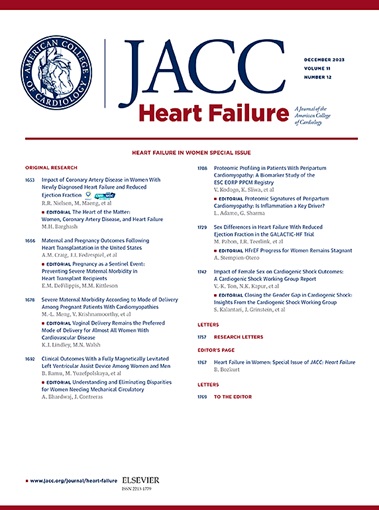评估二尖瓣 TEER 在治疗心力衰竭患者中度继发性二尖瓣反流中的作用。
IF 11.8
1区 医学
Q1 CARDIAC & CARDIOVASCULAR SYSTEMS
引用次数: 0
摘要
背景中度继发性二尖瓣反流(SMR)是心力衰竭(HF)患者中的一个亚群,其治疗仅限于药物治疗。本研究旨在通过扩展研究评估中度二尖瓣反流患者接受二尖瓣经导管边缘到边缘修补术(M-TEER)治疗的安全性和有效性。方法将 EXPANDed 研究(EXPAND [评估下一代 MitraClip 设备性能和安全性真实世界经验的当代前瞻性研究] 和 EXPAND G4 [MitraClip G4 系统安全性和性能的上市后研究评估] MitraClip 研究)中基线中度 SMR(2+)的受试者与基线重度 SMR(≥3+)的受试者进行比较。结果根据 ECL 评估,基线中度 SMR 的受试者为 335 人,重度 SMR 的受试者为 525 人。两个亚组的基线特征相似。经 M-TEER 治疗后,两组患者的 MR 均显著降低。中度 SMR 组的左心室舒张末期容积和收缩末期容积平均减少了 20 毫升以上。在中度 SMR 受试者中观察到 NYHA 功能分级(>78% NYHA 功能分级 I 级或 II 级)和生活质量(堪萨斯城心肌病问卷-总体总结>20 分)在 1 年内有显著改善。结论 在 EXPANDed 研究中,接受 M-TEER 治疗的中度 SMR 受试者在 1 年后的生活质量和 LV 重塑方面的改善程度与重度 SMR 受试者相似。未来的研究需要评估 M-TEER 是否对中度 SMR 的 HF 患者有益。本文章由计算机程序翻译,如有差异,请以英文原文为准。
Evaluating Mitral TEER in the Management of Moderate Secondary Mitral Regurgitation Among Heart Failure Patients
Background
Moderate secondary mitral regurgitation (SMR) represents a subgroup of heart failure (HF) patients with treatment restricted to medical therapy. Outcomes in patients with moderate SMR treated with mitral transcatheter edge-to-edge repair (M-TEER) are less well known.
Objectives
The aim of this study was to assess the safety and effectiveness of M-TEER in subjects with moderate SMR using the EXPANDed studies.
Methods
One-year outcomes in subjects from the EXPANDed studies (EXPAND [A Contemporary, Prospective Study Evaluating Real-world Experience of Performance and Safety for the Next Generation of MitraClip Devices] and EXPAND G4 [A Post-Market Study Assessment of the Safety and Performance of the MitraClip G4 System] MitraClip studies) with baseline moderate SMR (2+), per echocardiographic core laboratory (ECL) assessment, were compared with subjects with baseline severe SMR (≥3+).
Results
There were 335 subjects with moderate SMR and 525 with severe SMR at baseline per ECL review. Baseline characteristics were similar between the 2 subgroups. After treatment with M-TEER, significant MR reduction was achieved in both groups. Significant left ventricular (LV) reverse remodeling was observed through 1 year, with a >20 mL decrease in LV end-diastolic and end-systolic volumes on average in the moderate SMR group. Significant 1-year improvements in NYHA functional class (>78% NYHA functional class I or II) and quality of life (>20 points on the Kansas City Cardiomyopathy Questionnaire–Overall Summary) were observed in subjects with moderate SMR. Similarly, low rates of major adverse events, all-cause mortality, and HF hospitalizations were observed between the 2 subgroups through 1 year.
Conclusions
In the EXPANDed studies, subjects with moderate SMR treated with M-TEER had improvements similar to subjects with severe SMR in quality of life and positive LV remodeling at 1 year. Future studies are needed to evaluate if M-TEER would be beneficial for HF patients with moderate SMR.
求助全文
通过发布文献求助,成功后即可免费获取论文全文。
去求助
来源期刊

JACC. Heart failure
CARDIAC & CARDIOVASCULAR SYSTEMS-
CiteScore
21.20
自引率
2.30%
发文量
164
期刊介绍:
JACC: Heart Failure publishes crucial findings on the pathophysiology, diagnosis, treatment, and care of heart failure patients. The goal is to enhance understanding through timely scientific communication on disease, clinical trials, outcomes, and therapeutic advances. The Journal fosters interdisciplinary connections with neuroscience, pulmonary medicine, nephrology, electrophysiology, and surgery related to heart failure. It also covers articles on pharmacogenetics, biomarkers, and metabolomics.
 求助内容:
求助内容: 应助结果提醒方式:
应助结果提醒方式:


